Languages
The Making of An American
The immigrant's story: twas ever thus.
Posted By: Paul - Sun Mar 19, 2023 -
Comments (0)
Category: Emigrants, Immigrants and Borders, Ethnic Groupings, Jobs and Occupations, Languages, PSA’s, 1920s
Miss Esperanto
I have three references to this contest, from 1929, 1963 and 1967. No firm idea of how long it lasted, if it's still going on, or if it was held faithfully every year.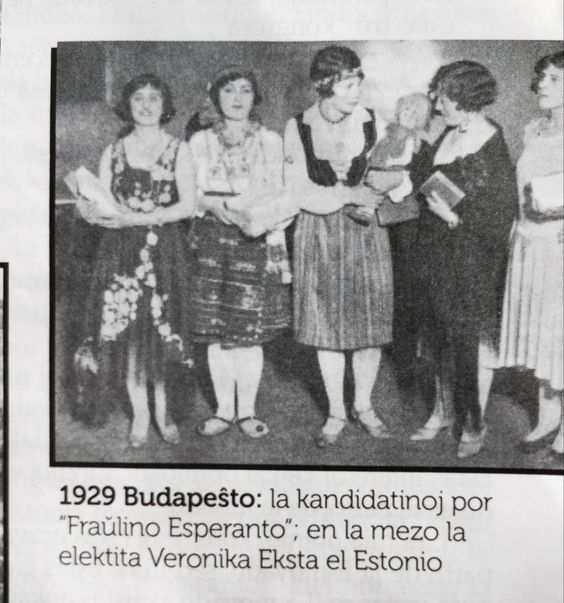
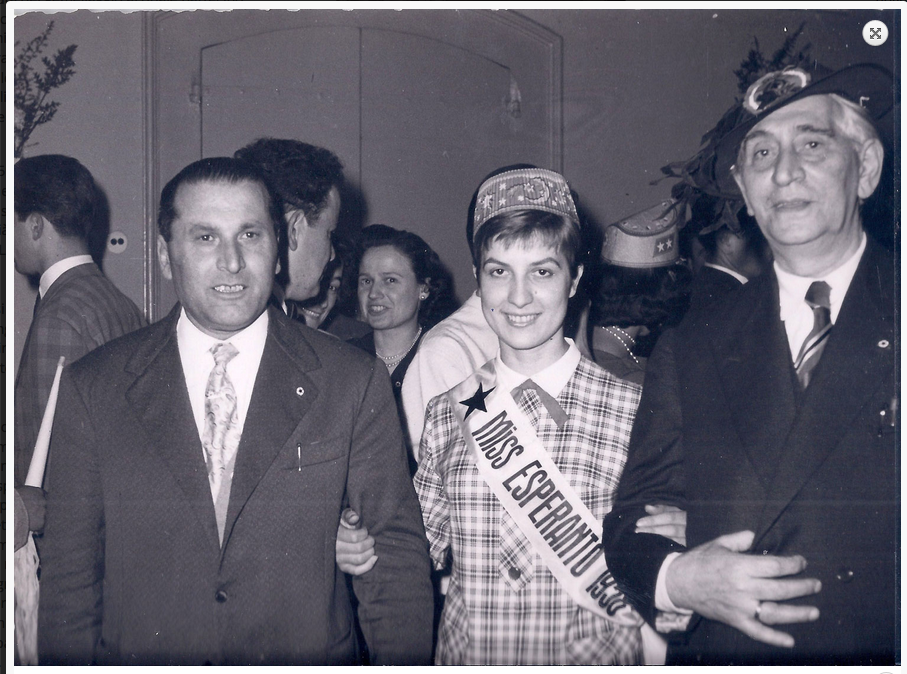

Puccini's opera 'La 66Bohème' was performed as a special performance for the Esperantists. Finally, Miss Maria Wenczel from Hungary was chosen as 'Miss Esperanto 1963'. Diethilde Magori from Germany and Helen Salmos from Sweden took second and third place in this competition. After the end of the congress, the young people drove to Sofija in a special caravan, where they were expected by the 48th Esperanto World Congress.

Posted By: Paul - Sun Oct 16, 2022 -
Comments (0)
Category: Awards, Prizes, Competitions and Contests, Beauty, Ugliness and Other Aesthetic Issues, Languages, 1920s, 1950s, 1960s
Flirtation Codes of the early 20th Century
What a chore flirtation must have been back then if you had to memorize all these codes.
Philadelphia Inquirer - Oct 8, 1916
Posted By: Alex - Sun Jan 16, 2022 -
Comments (5)
Category: Languages, 1910s, Love & Romance
Scott Perky’s Bi-Directional Text
Henry Perky invented shredded wheat. His son, Scott, was also an inventor, though not as famous. He invented and patented a bi-directional, symmetrical font which could be read from left-to-right or right-to-left.
Perky's idea was that this would allow one to read a line of text from left to right, and then read the next line right to left, without having to move the eye back to the beginning of the line. This, he claimed, would reduce "brain fag":
It is hardly necessary to allude to the strain upon the eyes and brain, which results from much reading. To students, researchers and others whose lives are cast among books, any device which promises to facilitate reading in such wise as to lessen fatigue of the optical tract, and consequent headache and brain fag, will appear of unusual importance.
Randy Ludacer of Beach Packaging Design took the time to set the first three lines of Perky's patent in the bi-directional font, so you can experience what it would be like to read it:

Posted By: Alex - Fri Oct 08, 2021 -
Comments (5)
Category: Inventions, Patents, Languages, 1900s
Underworld Lingo, 1930
Some of these look pretty dubious.Source.
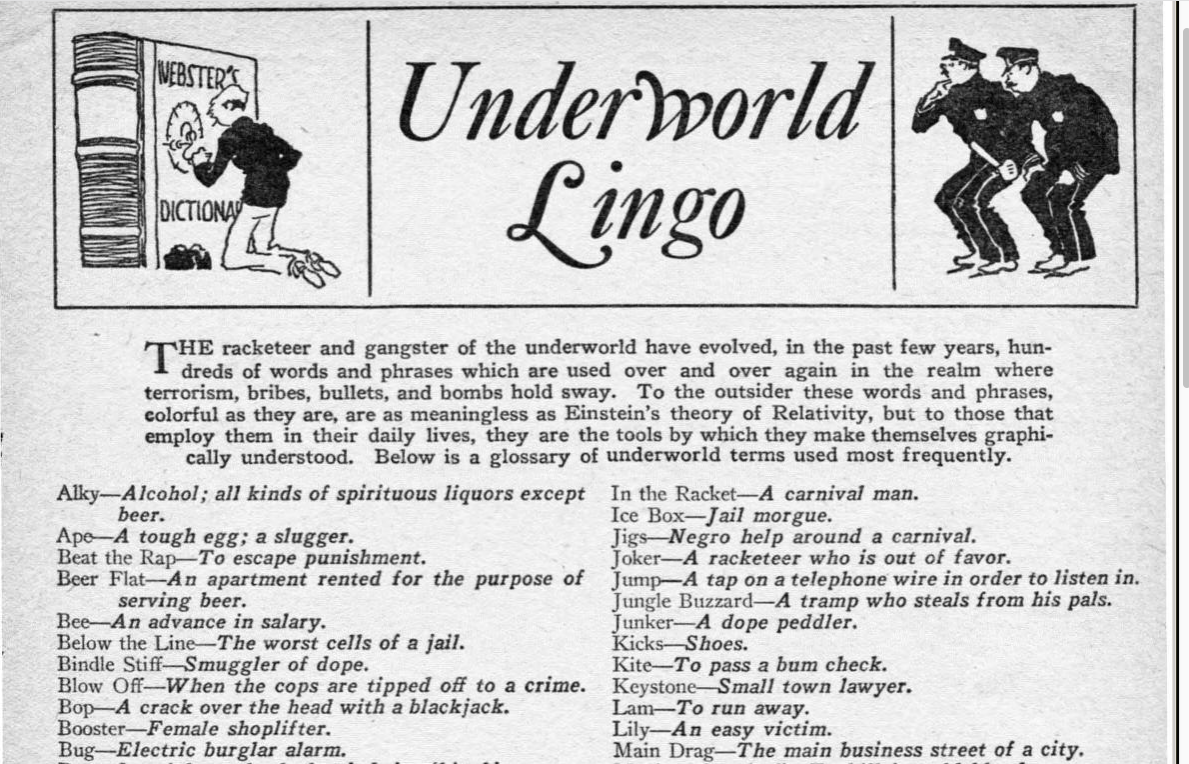
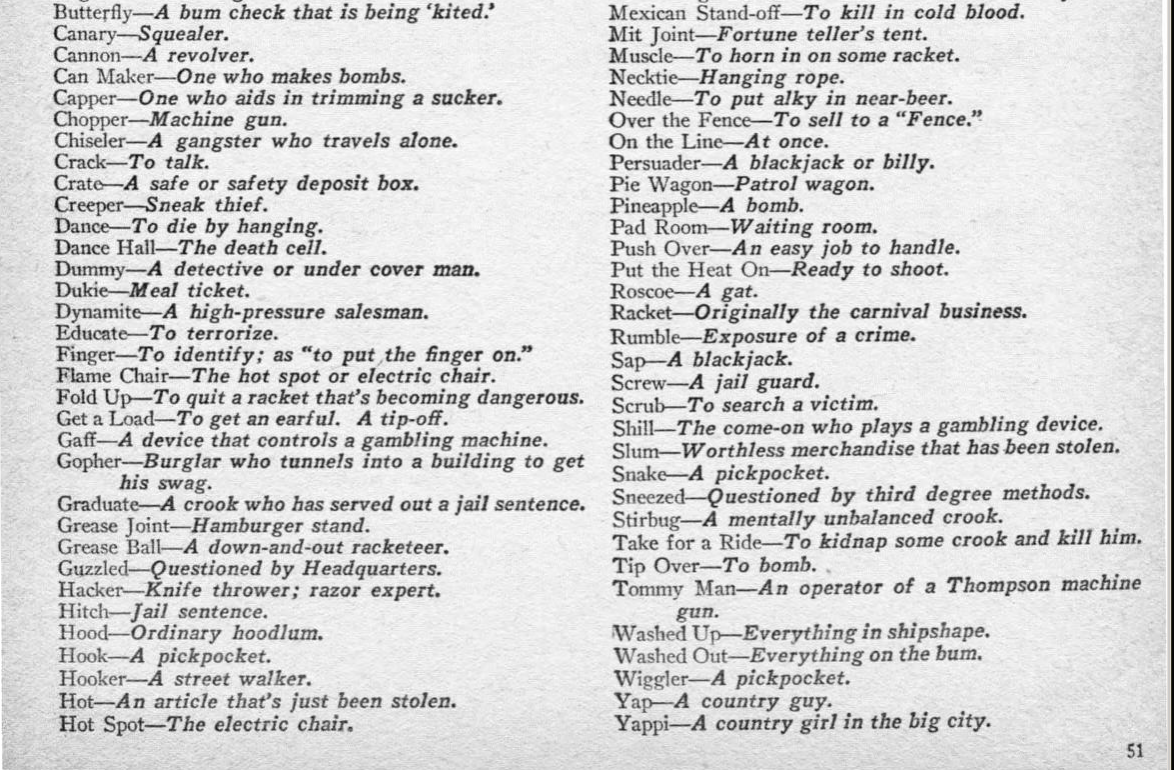
Posted By: Paul - Thu Oct 07, 2021 -
Comments (1)
Category: Crime, Languages, Slang, 1930s
240 different ways to spell the word Scissors
The author of this pamphlet, published in England in 1829, noted that he could expand the list to 480 variant spellings if he were to substitute 'z' for 's' at the end of the word. On this basis, he claimed that "The word Scissars appears capable of more variations in the spelling than any other."He seemed to prefer the spelling 'scissars' to 'scissors'.
He also seemed to think that the publication of this list offered some kind of moral lesson. But, despite his explanation, I still can't figure out what that lesson might be:
If engaged in writing for the amusement of the Public and cannot refrain from introducing subjects which may be prejudicial to the morals of the rising generation, had he not much better write nothing but Scissers...
If any other subject engage his attention, it will always be a very safe and adviseable plan to consider if at any future more serious moment he might not be inclined to wish he had written nothing but Scissurs.

Click to enlarge. Source: The Picture Magazine - 1895
Posted By: Alex - Mon Apr 26, 2021 -
Comments (0)
Category: Languages, Puns and Other Wordplay, Nineteenth Century
Morse Code for Drivers
In 1960, the Automobile Legal Association proposed that all drivers should learn a code that would allow them to communicate with each other on the road via honks.One short honk would mean, 'Left blinker going'. Three short honks would mean, 'A light burned out'. One long honk would mean, 'Get over in the right lane.' And so on.
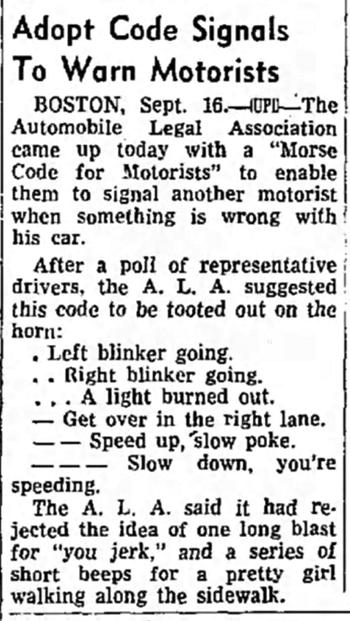
The Terre Haute Star - Sep 17, 1960
Although the honking code never caught on, the idea of allowing drivers to communicate with each other has persisted. The 21st-century spin on it are the various phone apps (such as bump.com, Driver Talk, or PL8chat) that allow you to send messages to other cars by entering their license plate number. Of course, both drivers have to be signed up with the app for this to work. Which means these apps have, for now, very limited practical use.
Posted By: Alex - Mon Feb 15, 2021 -
Comments (3)
Category: Languages, Cars
Dyr bul shchyl
The Russian artist Alexei Kruchenykh invented the Zaum language in 1913. He described it as "a language which does not have any definite meaning." From what I can gather, it was gibberish sounds strung together.Dyr bul shchyl, also written by Kruchenykh, was the first (but not last) poem written in Zaum.
ubeshshchur
skum
vy so bu
r l ez
You can hear Kruchenykh reading the poem aloud in the first clip. There's a more modern interpretation of it below.
Knowing Russian, or any other language, won't help you understand the poem. But according to Russian language expert Lucas Stratton, "critics have interpreted Dyr bul shchyl as an arrangement of sounds associated with a coming storm."
Posted By: Alex - Sun Nov 29, 2020 -
Comments (0)
Category: Languages, Poetry, 1910s, Cacophony, Dissonance, White Noise and Other Sonic Assaults
The Language of Deseret
I was unaware that Brigham Young created a new alphabet for his followers. "However, the alphabet failed to gain wide acceptance and was not actively promoted after 1869."Here is a page at the official Mormon site that tells of it.
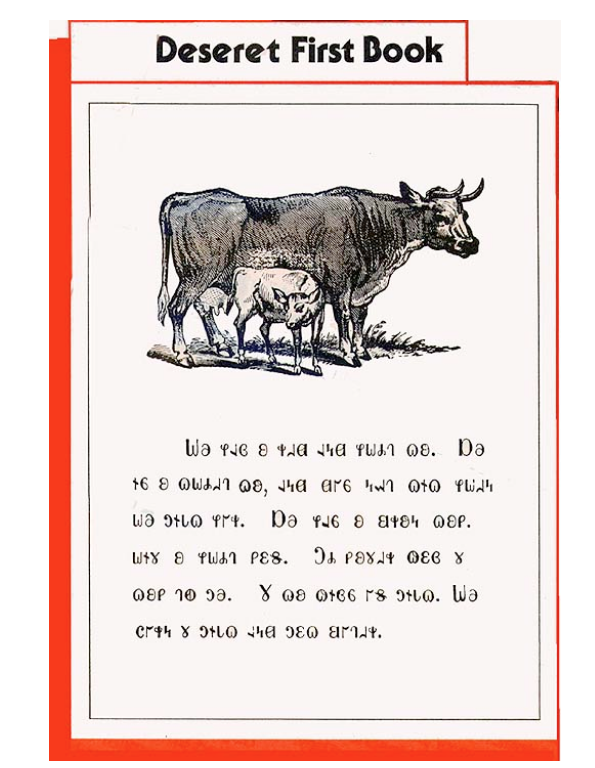
Here is an encyclopedia entry with the full alphabet.
Posted By: Paul - Sun Nov 29, 2020 -
Comments (5)
Category: Eccentrics, Inventions, Languages, Religion, Nineteenth Century

| Who We Are |
|---|
| Alex Boese Alex is the creator and curator of the Museum of Hoaxes. He's also the author of various weird, non-fiction, science-themed books such as Elephants on Acid and Psychedelic Apes. Paul Di Filippo Paul has been paid to put weird ideas into fictional form for over thirty years, in his career as a noted science fiction writer. He has recently begun blogging on many curious topics with three fellow writers at The Inferior 4+1. Contact Us |




